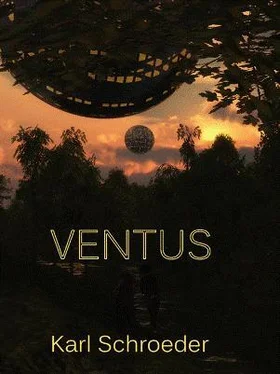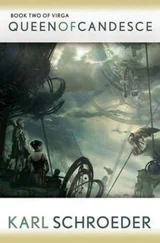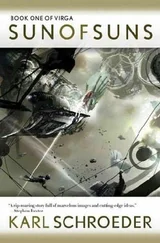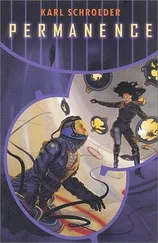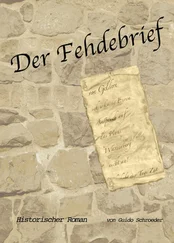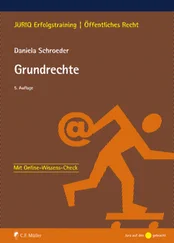His companions had frozen like rabbits caught in a garden. Lavin was about to step forward, say something else ingenuous (although he seemed to have exhausted his cleverness with that one statement) when suddenly Galas was surrounded by courtiers. They had rushed, without seeming to rush, around the edge of the dance floor, and homed in on her like falcons.
Galas became caught in a tangle of clever opening lines. They led her, without seeming to lead her, away to the lunch tables. Lavin stared after her, not heeding decorum.
When they had almost reached the tables, she turned and glanced back. At him.
He would always remember that moment, how happy he had been. Something had begun.
Harsh shouts ahead. Lavin opened his eyes. Hesty had led them to a deep gash in one of the hills near the city. Here, under the lurid light of bonfires, gangs of prisoners labored through the night to create missiles for their steam cannon.
Lavin and Hesty dismounted, and the colonel led him into the pit, where captured royalists cursed and wept on the stones they were chiseling, while Lavin's men whipped them.
Over the years workers had taken a large bite out of the hillside. The layers below proved to be made of salt. Lavin had not been here before, and he marveled at the cleanness of the carved walls. In daylight they would probably glow white. The whole place stank of ocean-side. The scent made him smile.
The salt was precious, and the entire site was under guard because his men wanted to walk off with the stuff. They had tried quarrying for proper stone but it was a good distance underground. Lavin wanted a heap of rock the size of a house near his cannon when it came time to fire on the city. The salt was available; precious or not, he would use it. His men could collect the shards off the street later and buy their own rewards with it. Lavin couldn't buy what he wanted, so he was indifferent to its lure.
"It's over here!" One of the overseers waved at them from across the pit. A large crowd had gathered there, numbering both soldiers. The prisoners showed no fear, but glanced up at Lavin with frank eyes as he strode past. Their attitude made him uncomfortable—they were her creations, and he didn't understand them.
"Sir!" The overseer saluted hastily. His broad belly gleamed with sweat in the torchlight. He stood over a large slab of white salt, perhaps twice the length and width of a man, and at least half a meter thick. Two brawny soldiers were brushing delicately at its surface with paint brushes.
Lavin cocked his head skeptically, and looked at Hesty and then the overseer. "You got me up in the middle of the night for this?"
"Sir. Look!" The overseer pointed. Lavin stepped up to the slab.
There was a man buried in it. The outline of a man, anyway, blurred and distorted, visible through the pale milky crystal crystals. Lavin stepped back in shock, then moved in again, repelled but fascinated.
"Where..."
"The whole slab came off the face over there," the overseer pointed, "about two hours ago. Killed the man it fell on. When they went to get him they thought he'd climbed out and died on top of the thing—they saw the outline, see? But his leg was sticking out from underneath." He laughed richly. "Three legs was a bit unlikely, eh. So they looked closer. Then they called me. And..." he seemed to run out of steam, "I called the colonel."
Hesty traced the outline of the figure with his fingertip. "We have the quarry foreman. He thinks the layers we're working in were laid down eight hundred years ago, by the desals."
Lavin lifted whitened fingers to his face. The sea. "So at that time, this area was a salt flat? How then did it become hilly?"
"Mostly runoff, but this is more of an underground salt mountain than a flat. Otherwise the whole area for kilometers would be mined. But sir: look at this."
Below, and a little to the right of the body, a dark line transected the crystal block. "What is it?"
The soldier, Lavin saw, wore some kind of uniform. He could make out the bandoliers. And poking over his shoulder was, unmistakably, the barrel of a musket.
Lavin caught his breath. Muskets were the property of the royal guard. Always had been, as far as he knew... and he was right. Even so many generations ago, Iapysia had been exactly as it was when Lavin was a boy. And then came Galas, to break all the ancient traditions and bring her people to ruin.
Something else glinted in the torchlight. He bent closer to examine what might be the soldier's hand. "More light. Bring some hurricane lanterns here. I want to see it." People hurried to obey. Lavin heard Hesty chuckle behind him.
Yes, your distraction worked, Hesty, he thought. Be smug about it if you want.
When they had brought the lanterns Lavin took another good look. He was right: preserved in the salt, wrapped around the withered finger of the soldier, was a silver ring.
He stood back, knuckled his eyes and was rewarded by a salty sting. "I want that."
"Sir?..."
"The ring. Get it off the corpse. Bring it to me." He blinked around at the men. They looked uniformly uncomfortable.
"I'm not grave-robbing. We'll return it to him after the siege, and accord him full honors as a member of the king's guard when we inter him. But this ring is a powerful symbol of the continuity of the dynasty. Think about it. I want it on my hand when I ride into battle."
With that he turned away to remount his horse.
Back in his tent he prepared for bed. Something told him he would sleep this time. His lamp still burned above the camp table, and as he bundled his shirt to use as a pillow, his eye was drawn to Galas' book, which still sat open to the passage he had read earlier.
Lavin marveled that he had been so mesmerized by the words. Now, the book beckoned again, and he wondered if Hesty's distraction had been enough to break the spell it had cast over him. He hesitated; then, when he realized he was acting like he was afraid of the thing, he stalked over quickly and bent to read:
An ancient sage held that in different ages, humans held the senses in different ratios, according to the media by which they communicated and expressed themselves. Hence before writing, the ear was the royal sense. After writing, the eye.
We say that similar ratios pertain between emotions. Each civilization has its royal affect, and its ignored or forgotten feelings. Or rather—there are no distinct emotions. You have learned that in the human heart, love resides within such and such a circle, hate there in another, and between are pride, jealousy, all the royal and plebeian emotions. We say instead emotion is one unbounded field. Our way of life causes us to cross this field, now in one direction, now another, again and again on our way to the goals to which our world has constrained us. The paths crisscross, and eventually the field has well-travelled intersections, and blank areas where we have never walked.
We name the intersections just as we do towns but not the empty fields between them. We name these oft-crossed places love, hate, jealousy, pride. But our destinations were made by the conditions of our lives, they are not eternal or inevitable.
We know that the answer to human suffering lies in changing the ratio of emotions so grief and sorrow lie neglected, even nameless, in an untraveled wild.
The task of a Queen is to rule a people truly. The task of the Queen of Queens is to rule Truth itself. We know that the highest act of creation is to create new emotions, superior to those which, unguided, have fallen to us from Nature. And this We shall do.
As We have won new fields and towns from Nature, We shall win new feelings, superior to love and loyalty, from the field of the human heart.
Читать дальше
